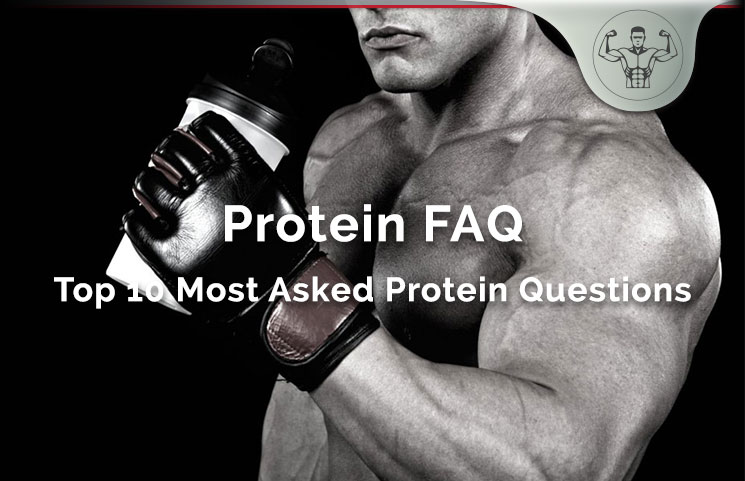Protein is a powerhouse in our bodies. Everywhere you go, you will always find a healthcare provider who questions you about your protein intake. This makes it one of the top food nutrients that are necessary to the body. With the ability to carry out many functions, such as muscle building, protection of the body, and weight management, protein should not be missed on your daily menu.
In the nutritional game, there are many questions regarding the intake of proteins. The big questions have left many thinking about the protein itself: How much should I take? Which type should I take, and how often should I take this protein? Does this protein source have any side effects?
These and other questions will be answered in this Protein FAQ article, which tackles the most asked questions where this macro nutrient is involved.
Protein FAQ
1. Can The Body Use 30 Grams Of Protein At Once?
This is a question that has been asked many times and surprisingly, it isn’t true that your body functions to synthesize all the protein you take per meal. The different types of foods feature varying amounts of protein, and your stomach doesn’t have trackers to measure the protein you take in.
Instead, most of your ingested protein will dissociate and be used by the body in different steps. Although many researchers still suggest the measure of 30 grams, it’s also valuable to eat the protein with the given measure per meal as it will boost the protein digestion and make your digestion easier to occur.
2. Do I Need To Eat More Protein To Build My Muscle Faster?
You need to eat more to increase your muscle development faster. An essential thing about protein intake is the breakdown of the protein into energy components. The calories made will act as building units for your muscles. Note that when you remain in the bracket of 30-35 percent of the protein intake, your muscles will build up faster.
When you take in a lot of proteins thinking that you will develop your muscles faster, sometimes the results are counterproductive, and you will hinder the processing of other bodybuilding ingredients. Because of this, your bodybuilding goals might delay or not give the much sought after results.
All in all, it’s suggested that consumption of 1 gram of protein per pound daily will give you positive results when building your muscles
3. Will I Gain Fat From Overeating Protein?
This is a big issue, and protein intake can be quite challenging when you focus on the results. Many have doubted how protein which is essential for muscle building can make someone fat. Well, with protein, when you take in the right amount, it’s synthesized and used in the body.
If you take in excess, then the surplus will have to be converted to fats, although it’s a hard process as compared to other protein buddies that turn into fats. Additionally, more protein leads to an increase in oxidation, and this will make you burn fewer carbs and fats for fuel.

4. Is There An Ideal Protein Source?
This is one of the most frequently asked questions and to tackle it better, you need to look at the kind of proteins needed by your body. There is the complete protein which contains nine components needed by your body. This protein is referred to as essential protein and isn’t manufactured by the body. Most of it originates from animal and plant products. You will find products like eggs, fish, and milk are highly preferred as they contain the body’s building blocks needed.
There are numerous methods which determine and measure the protein quality. The preferred method that has been authorized by the FDA is the Protein Digestibility Corrected Amino Acids Score (PDCAAS), which gives the value of 1 as the best possible measure of quality.
5. If You Cook Protein Powder, Will It Become Denatured?
Cooking protein beyond a certain heat level might cause denaturing of this protein. Denaturing is a process by which proteins lose their value and become functionless. Cooking powder protein might not cause it to lose its value.
This is a comparison to when you cook meat, and it doesn’t necessarily lose its biological value and function. Instead, the protein is retained for the body’s use. Similar to powdered protein, just cook it and do not worry about losing the protein component from the kitchen. The components will remain, and you will not need to add other ingredients to your protein.
6. Will My Bone Health Be Impacted If I Follow A High Protein Diet?
Your bone health is important and needs to be maintained in the best form possible. When you take in a lot of proteins, research shows that more calcium is lost through urine, but the same study failed to prove that the lost calcium came from the bones. More research shows that high protein intake leads to increased bone density.
7. Will My Kidneys Be Harmed When I Take A High Protein Diet?
If you have a kidney problem, then you might experience problems, but under normal circumstances, protein intake is healthy. Consult your doctor before you change your diet. Also, consume enough water when you take in the protein to avoid other digestion complications.
8. Is There Anything That Will Increase My Protein Intake?
If you are under an activity that leads to caloric restriction, then you would want to have more protein intake. Instances such as stress and recovery from injury will need more protein. Sometimes the protein taken is used as fuel, hence its needs is a necessity.
9. Between Protein Powder And Real Food, Which Is Better?
This depends on the person. All these types of proteins are essential and are only dependent on the amount the body needs. In most cases, real food might have extra advantages like chewing and other nutritive value compared to powder that you only need to shake.
10. Who Needs More Protein: Endurance Athletes Or Weight Lifters?
This depends on the strength you are using as a sportsman. First, when you are an athlete, it means that the exercise you do requires more energy, hence more protein intake. If you are a weight lifter with the goal of taking part in competitions, then your intake will also be high as compared to someone who lifts weight for fitness or fun.
Protein FAQ Final Words
Protein intake is essential, especially if you are building your muscle or engaging in an activity that needs more energy. Therefore, you at least need enough protein for your body to function for maximum health.









